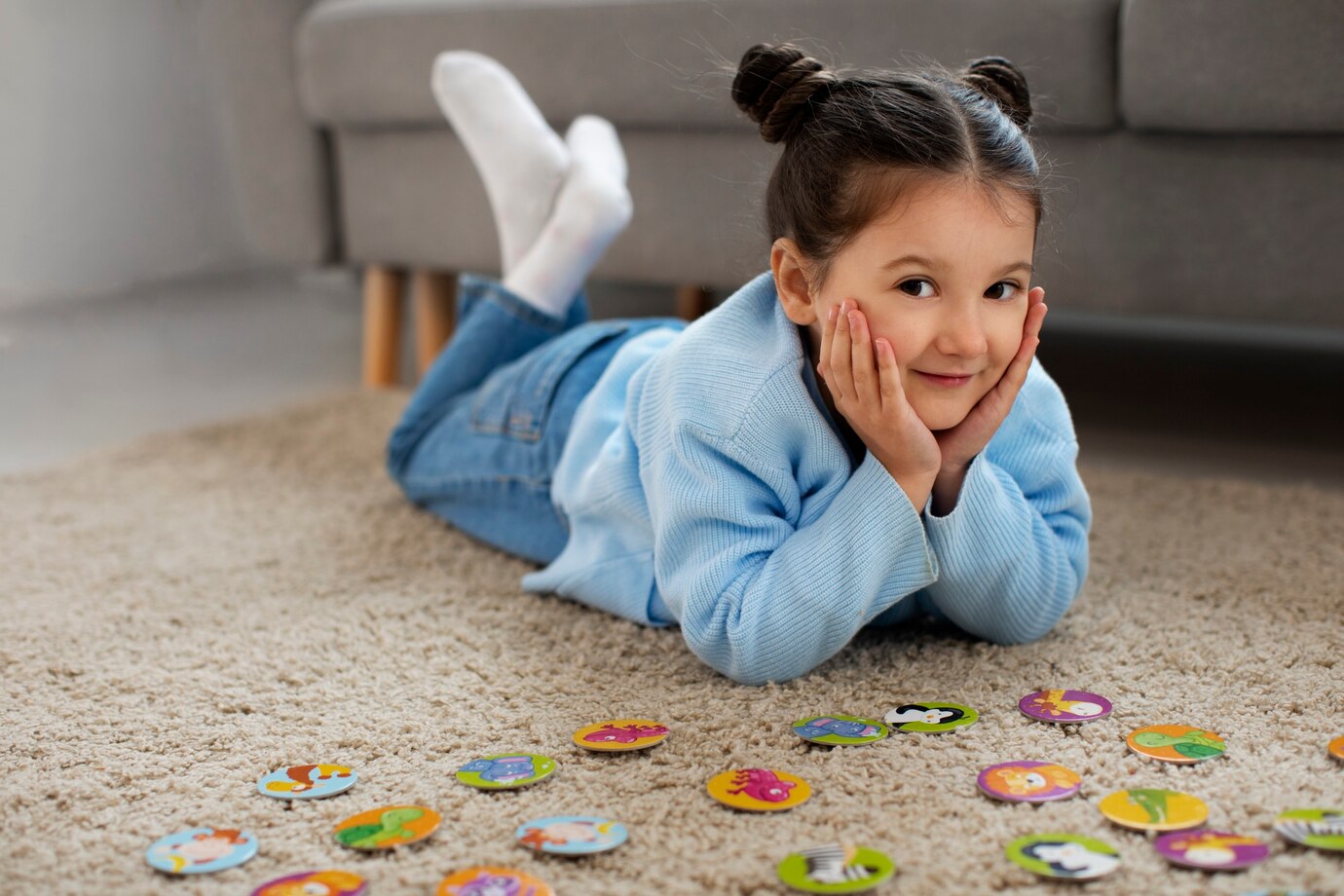
How to Build Your Child’s Confidence from an Early Age
Raising confident and independent children is a goal shared by many parents. Confidence is a vital component of a child’s development. It affects how they face challenges, build healthy relationships, and follow their passions. A child with high self-esteem is more likely to take on new experiences, develop resilience, and believe in their abilities.
In this blog, we will explore the best ways to boost self-esteem and instil confidence-building habits in kids from an early age. Parents can build a strong foundation for their children’s future success. They need to understand the importance of confidence and use effective strategies. We will also highlight common mistakes to avoid and provide expert insights on fostering confidence in children.
Quick Guide: How to Build Your Child’s Confidence from an Early Age
- Boost your child’s confidence by encouraging independence, celebrating effort, and providing constructive feedback.
- Create a supportive environment and model confident behaviours to foster self-esteem and resilience.
The Importance of Building Confidence in Children

Why Confidence Matters
Confidence is more than just a trait; it is a crucial life skill that affects every aspect of a child’s life. Kids with healthy self-esteem usually have a good self-image. This shapes how they engage with the world.
Confident children are more likely to:
- Excel academically and socially
- Handle setbacks with resilience
- Make decisions independently
- Build and maintain healthy relationships
- Assert themselves in various situations
- Take on new challenges without fear
Children with low self-esteem often find social interactions tough. They may feel anxious in new situations and are less likely to take on leadership roles. They may struggle with constructive criticism. This can lead to feelings of failure and discouragement.
Real-Life Applications
Consider a child who is confident in their abilities. They are more likely to join class discussions, take part in activities, and make lasting friendships. In contrast, a child with low self-esteem may shy away from opportunities, fearing failure or rejection.
For instance, an eight-year-old child named Sarah struggles with math. If she has confidence in her ability to improve, she will seek help, practice, and eventually overcome her struggles. However, if she lacks confidence, she may give up easily, assuming she is simply “not good at math.” By fostering confidence, parents help children develop a growth mindset and persistence.
Pro Tip: Focus on praising effort over innate ability to help your child develop a growth mindset and resilience.
Best Ways to Boost Self-Esteem in Children

Building confidence in children requires intentional efforts from parents and caregivers. Here are some effective strategies to foster self-esteem and confidence-building for kids:
Encourage Independence
One of the best ways to boost self-esteem is by encouraging independence. Allow children to make age-appropriate decisions and solve problems on their own. This helps them develop critical thinking skills and instils a sense of autonomy and competence.
Examples include:
- Allowing a child to pick out their clothes for the day
- Encouraging them to order their own meal at a restaurant
- Letting them choose between different extracurricular activities
Celebrate Effort, Not Just Success
It’s important to acknowledge and celebrate a child’s efforts, not just their achievements. Praising hard work and perseverance teaches children that success is a result of effort and dedication. This mindset encourages them to embrace challenges and view setbacks as opportunities for growth.
For example, instead of saying, “You’re so smart!” try saying, “I can see how hard you worked on that project, and your effort really paid off!” This shifts the focus from innate ability to effort, fostering resilience and a strong work ethic.
Provide Constructive Feedback
Constructive feedback is essential for building confidence. When offering feedback, focus on specific behaviours and provide guidance on how to improve. Avoid harsh criticism, as it can undermine a child’s self-esteem. Instead, use positive reinforcement to motivate and inspire.
Effective Feedback Example:
- Instead of: “You’re terrible at drawing.”
- Try: “I love how creative your drawing is! If you add more details, it will look even better.”
Create a Supportive Environment
A supportive environment is crucial for raising confident children. Ensure that your home is a safe space where children feel valued and heard. Encourage open communication and actively listen to their thoughts and feelings. This fosters a sense of belonging and security.
Ways to create a supportive environment:
- Set aside dedicated one-on-one time with your child
- Encourage open conversations about their feelings
- Validate their emotions and reassure them when they face difficulties
Model Confidence
Children often learn by observing their parents. Model confident behaviour by demonstrating self-assurance in your actions and decisions. Show them how to handle challenges with grace and resilience. Your behaviour sets a powerful example for your children to emulate.
For example, if you make a mistake, instead of becoming frustrated, say: “I made a mistake, but that’s okay. I’ll learn from it and try again.” This teaches children that mistakes are a natural part of growth.
Important: Avoid overprotecting your child, as it can hinder their development of confidence and independence. Let them experience challenges and learn from them.
Additional Expert Tips & Common Mistakes to Avoid
Best Practices for Building Confidence
Here are some expert tips to help build kids’ confidence:
- Encourage Exploration: Allow children to explore their interests and passions. This helps them discover their strengths and build confidence in their abilities.
- Set Realistic Expectations: Set achievable goals for your children and celebrate their progress. Unrealistic expectations can lead to feelings of inadequacy and low self-esteem.
- Promote Positive Self-Talk: Teach children to use positive affirmations and self-talk. This helps them develop a positive mindset and boosts their confidence.
Common Mistakes to Avoid
While building confidence is essential, it’s important to avoid certain pitfalls:
- Overpraising: Excessive praise can lead to an inflated sense of self-worth. Focus on genuine, specific praise that acknowledges effort and improvement.
- Comparisons: Avoid comparing your child to others. Each child is unique, and comparisons can erode self-esteem and create feelings of inadequacy.
- Overprotection: It’s natural to want to protect your child. Overprotection can hinder their ability to develop independence and confidence.
Advanced Insights & Expert Recommendations
Foster a Growth Mindset
Encourage children to view challenges as opportunities for growth. A growth mindset fosters resilience and a willingness to learn from mistakes.
For example, if a child struggles with a new skill, remind them: “You might not be good at it yet, but with practice, you will improve.”
Encourage Problem-Solving
Provide opportunities for children to solve problems independently. This not only builds confidence but also enhances critical thinking skills.
Examples include:
- Letting them decide how to complete a school project
- Asking them how they would resolve a disagreement with a friend
Engage in Mindfulness Practices
Mindfulness can help children develop self-awareness and emotional regulation. Encourage practices such as meditation or deep breathing to promote calmness and confidence.
Frequently Asked Questions (FAQ)
How can I help my child overcome self-doubt?
Promote positive self-talk. Celebrate their efforts. Remind them of past successes. This will boost their confidence.
What if my child is shy and hesitant to try new things?
Support them gently. Introduce new experiences slowly. Reinforce their efforts instead of pressuring them.
Can too much praise hurt my child’s confidence?
Yes, excessive or insincere praise can lead to dependency on validation. Focus on praising effort and perseverance instead.
How do I handle my child’s fear of failure?
Teach them that failure is a learning opportunity. Share personal stories of how mistakes helped you grow.
How do I build my child’s confidence in social settings?
Foster social interactions. Practice role-playing conversations. Help them build communication skills through group activities.
Raising Confident Kids: Small Steps, Big Impact

Raising confident and independent children requires intentional effort and a supportive environment. Parents can help kids build confidence and boost self-esteem. This way, children can thrive in every part of life.
Confidence is a journey, not a destination. By nurturing self-esteem from an early age, parents can set their children on a path to success and fulfilment. The journey begins with you.